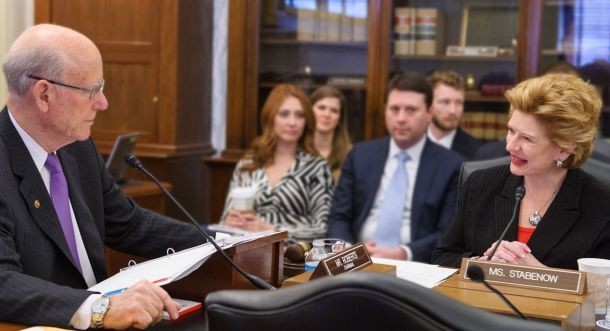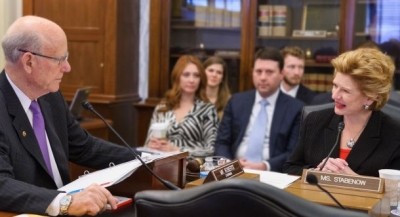USDA addresses concerns about the narrow definition of 'bioengineered'
Federal GMO labeling bill a step closer after 65-32 cloture vote in Senate

(The cloture vote needed 60 votes to cut off debate, and clears the way for a final vote on the legislation.)
The bill in question – proposed by Senator Debbie Stabenow (D-MI) and ag committee chairman Senator Pat Roberts (R-KS) - still needs to gain approval in the House of Representatives, but would trump all state-led GMO labeling laws including the one that has just come into effect in Vermont.
It also has the support of the Grocery Manufacturers Association (GMA), which has historically opposed a mandatory approach but likes the flexibility the bill offers manufacturers over the form that on-pack disclosures might take.
Vermont governor Peter Shumlin and anti-GMO activists, however, have condemned the bill, which Food & Water Watch argued was “designed to ensure that big food processing companies and the biotechnology industry continue to profit by misleading consumers” (by allowing companies to use QR codes or other symbols instead of forcing them to state on pack that a product uses GMOs).
What is the scope of the bill? And what does 'bioengineered' mean?
The bill requires labeling of ‘bioengineered’ foods but appears to limit them to foods containing “genetic material that has been modified through in vitro rDNA techniques [which involve transferring a gene from one organism to another].”
Its focus on rDNA techniques also appears to exempt foods made via new biotech techniques such as gene editing, while the FDA (in a technical assessment of the bill) has warned that its reference to foods containing genetic material might also exclude scores of foods containing oils, sugars, starches, and sweeteners derived from GM crops, in which no detectible ‘genetic material’ might be present because they are so highly refined.
USDA: Scope is wider than wording suggests
While this narrow definition of ‘bioengineered’ has raised concerns from commentators on both sides of the GMO labeling debate, however, USDA says its scope is wider than the wording might suggest.
In a July 1 letter to Senator Stabenow, Jeffrey Prieto, general counsel at USDA, said the bill gave USDA (the implementing agency) the authority to include “novel gene editing techniques such as CRISPR when they are used to produce plants or seeds with traits that could not be created with conventional breeding techniques.
“In addition, the definition provides authority to incude RNAi techniques that have been used on products such as the non-browning apple and potato.”
It also gave USDA the authority to include foods made with “highly refined oils, sugars or high fructose corn syrup” derived from GM crops, he added.
“The department would look not only at the definition… regarding the genetically modified crops used to produce the refined or extracted materials, but also consider authority provided… with respect to the amount of a bioengineered substance present and other factors and considerations which might deem the product to be considered bioengineered food.”
"It’s a sad day when so many members of the U.S. Senate sell out to big food and big business and turn their backs on those who elected them. This flawed bill is a capitulation to the food industry that does not even come close to providing the transparency that consumers deserve.
“Vermont acted in good faith to provide its citizens with a common sense labeling law that guarantees clear, accessible information. For a Republican-controlled Congress that continually argues for states’ rights to act to take away Vermonters’ right to know what is in their food is the height of hypocrisy..."
Vermont governor Peter Shumlin
"Today’s strong bipartisan Senate vote is a key step towards passage of this vitally important legislation to protect consumers, farmers and businesses from the harmful effects of Vermont’s GMO labeling law.
“But the work isn’t done yet. The Senate needs to pass the bill this week so that it can be voted on by the House before the July recess at the end of next week."
Pamela Bailey, president and CEO, Grocery Manufacturers Association (GMA)
Listen to Senator Pat Roberts’ remarks on the Senate floor today:
The 14-page bill - if passed - will come into force two years after it is enacted.
- Like many state-led bills, it does not require labeling on milk or meat from animals fed GM feed, or food sold in restaurant “or similar retail food establishment.”
- It does not make any reference to ‘natural’ claims, meanwhile, which have been a feature of many state-driven GMO labeling bills, including Act 120 in Vermont.
- Under the legislation, food companies would have the option of disclosing GMO ingredients via “text, symbol or digital link.” Small manufacturers (which are nor defined in the text, but would get an additional year to comply) would be allowed to list a phone number for consumers to call, or a website.
- Those using smartlabels or other digital disclosures would have to add a phrase such as ‘Scan here for more food information,’ but would not have to use the term ‘GMO’ on the label, something to which anti-GMO activists strongly object.
- Small companies would have the option of putting a phone number or website URL on labels instead of the digital code.
- As for measures designed to appease those likely unhappy with the concessions over smart labels and digital codes, the bill says that USDA must conduct a survey no later than a year after enactment date to “identify potential technological challenges,” which may prevent some consumers from accessing the GMO disclosures via “electronic or digital disclosure methods.”
- If USDA determines that people are not able to access the information, other options will be explored, says the bill.












